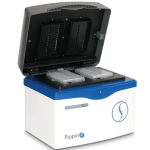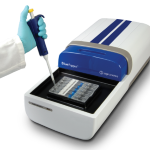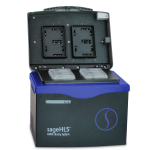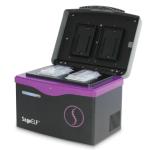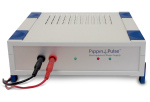A big paper came out of Richard Young’s lab at the Whitehead Institute last month in Cell describing the mechanism through which the c-Myc transcription factor causes elevated expression in tumor cells. We were happy to see that the Pippin Prep from Sage Science was used with the ChIP DNA prior to sequencing on Illumina.
The paper is important because high levels of c-Myc have long been known to correlate to poor clinical outcomes for cancer patients, but the biology behind this connection was not understood. In general, the scientific community had theorized that these effects involved “newly activated or repressed ‘Myc target genes,’” the authors write.
Instead, what they found in this study is that in cancer cells with elevated levels of c-Myc, “the transcription factor accumulates in the promoter regions of active genes and causes transcriptional amplification, producing increased levels of transcripts within the cell’s gene expression program,” the authors report. “Thus, rather than binding and regulating a new set of genes, c-Myc amplifies the output of the existing gene expression program.” Because the gene expression of tumor cells is so high, these cells are able to escape natural biological mechanisms that would normally find and kill malignant cells.
Check out “Transcriptional Amplification in Tumor Cells with Elevated c-Myc” for more.
